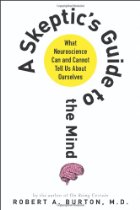 Episode 42
Episode 42 of the
Brain Science Podcast is a discussion of
On Being Certain: Believing You Are Right Even When You're Not by Robert Burton, MD. This part 1 of a two part discussion of the unconscious origins of what Dr. Burton calls "the feeling of knowing." In Episode 43 I will interview Dr. Burton. Today's episode provides an overview of Dr. Burton's key ideas.
In past episodes I have discussed the role of unconscious decision-making.
On Being Certain: Believing You Are Right Even When You're Not by Robert Burton, MD takes this topic to a new level. First, Dr. Burton discusses the evidence that the "feeling of knowing" arises from parts of our brain that we can neither access or control. Then he discusses the implications of this finding, including the fact that it challenges long-held assumptions about the possibility of purely rational thought.
 Listen to Episode 42 of the Brain Science Podcast
Listen to Episode 42 of the Brain Science Podcast
References and Links:
On Being Certain: Believing You Are Right Even When You're Not by Robert Burton, MD
Neisser, U., and Harsh, N. "Phantom Flashbulbs: False Recollections of Hearing the News about Challenger," in Affect and Accuracy in Recall: Studies of "Flashbulb" Memories, Winograd, E., and Neisser, U., (New York: Cambridge University Press, 1992)
The Seven Sins of Memory: How the Mind Forgets and Remembers by Daniel L. Schacter
The Feeling of What Happens: Body and Emotion in the Making of Consciousness by Antonio Damasio
Philosophy in the Flesh : The Embodied Mind and Its Challenge to Western Thought by George Lakoff and Mark Johnson
Other Scientists Mentioned in this Episode:
- Leon Festinger-proposed the theory of cognitive dissonance in 1957
- Joseph Ledoux-research with rats and the role of the amygdala in the fear response
- Michael Merzenich-showed how the auditory cortex in young rats is affected by experience
 Listen to Episode 42 of the Brain Science Podcast
Listen to Episode 42 of the Brain Science Podcast

 Subscribe via iTunes™
Subscribe via iTunes™
 Subscribe in a reader or podcatcher
Subscribe to Brain Science Podcast with Dr. Ginger Campbell by Email
Donations and Subscriptions are appreciated
Subscribe in a reader or podcatcher
Subscribe to Brain Science Podcast with Dr. Ginger Campbell by Email
Donations and Subscriptions are appreciated

Send email feedback to Ginger Campbell, MD at docartemis at gmail.com
Share your comments on the Discussion Forum
 The latest episode of the Brain Science Podcast (BSP 96) marks the return of one of my favorite guests: retired neurologist and author Dr. Robert Burton. We discussed his new book A Skeptic's Guide to the Mind: What Neuroscience Can and Cannot Tell Us About Ourselves. In this book Dr. Burton expands on the ideas he first presented in On Being Certain: Believing You Are Right Even When You're Not. He also argues that because mental sensations like certainty, agency, and causation originate outside of conscious awareness there are inherent limits in our ability to use neuroscience to understand the Mind. This is a somewhat controversial and definitely thought-provoking position, which I invite you to explore further by listening to this interview.
The latest episode of the Brain Science Podcast (BSP 96) marks the return of one of my favorite guests: retired neurologist and author Dr. Robert Burton. We discussed his new book A Skeptic's Guide to the Mind: What Neuroscience Can and Cannot Tell Us About Ourselves. In this book Dr. Burton expands on the ideas he first presented in On Being Certain: Believing You Are Right Even When You're Not. He also argues that because mental sensations like certainty, agency, and causation originate outside of conscious awareness there are inherent limits in our ability to use neuroscience to understand the Mind. This is a somewhat controversial and definitely thought-provoking position, which I invite you to explore further by listening to this interview.



